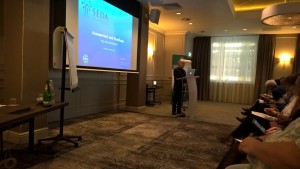The conference topic innovations in assessment was clearly a popular choice despite there having been a lot of dissemination of assessment developments over the last decade. It seems that whilst there has been many advances in this area there is still evidence that practice could be further enhanced. The conference provided an opportunity to hear about practice across the sector and how developments can further enhance practice.

There were three excellent key notes through the conference. The first from Ian Pirie University of Edinburgh started by outlining the background to his talk with reference to the good practice across the sector but the NSS still shows that there are issues. His key message was that assessment needs to be integrated into learning as part of pedagogy and not just added on to the end of modules and programmes. Today’s students do need different assessments as the world is rapidly changing and the students need skills that will help them gain employment within this world. Students do not need to have lectures that just provide information as they can gain this elsewhere but they do need to be engaged in active learning that challenges and develops them. Ian stressed we need to teach students to be more creative and innovative and so assessment needs to focus on this too. The design needs to assess not just the work but their development as a person. Assessment is an academic judgement but one that must be based on clarity of what is being assessed and explicit criteria that students understand. One approach to ensuring this is to engage students in re-writing the learning outcomes so that students have these in a language they understand. In terms of feedback this should help students make improvements but this means they cannot be passive recipients of this. We have to help students take responsibility for their learning and engage with the feedback.
The second keynote focused on the feedback conundrum: finding the resource for effective engagement Professor Margaret Price, Oxford Brookes University. Margaret favours discussing assessment as ORA which is ownership, Responsibility and Autonomy. We know that assessment is a key driver for learning and yet we do not draw on pedagogic developments for assessments. The discourse used is so often focused on checking the grade, grade inflation and fairness. Many have moved to anonymous marking and yet we know students want personalised feedback. Authentic assessment is what the employer market wants and yet we continue to use traditional approaches. Margaret’s key message was around the assumption that designing assessment at the module level is sufficient but assessments need to be viewed at programme level and we have to move to this. Research has shown that where the where the assessments are designed across the programme students do well and yet where they are a collection of modules students did poorly. Students go through programmes mostly seeing only their own work and so have no chance to compare. We need to create a community of practice that includes students.
The last keynote Changing the culture of assessment and feedback through TESTA Professor Tansy Jessop, Professor of Research Informed Teaching, Southampton Solent University. Tansy was involved in the HEA TESTA project. TESTA shifts the focus of discussion about assessment and feedback positively from ‘my’ module to ‘our’ module and programme and away from individual modular design to coherent team design. There is also a shift from teacher focus to student experience. What is needed is iterative cycles of reflection over modules. Feedback needs to change from telling students to feedback as asking questions. Assessment has not developed with the teaching to draw on the latest pedagogies and move from transmission to socially constructed models of assessment.
These three keynotes complimented each other well and the parallel sessions then enabled the messages to be explored in more detail through a range of projects.
To see more about some of the individual sessions visit my conference blog https://blogs.city.ac.uk/pamsconferences/



Leave a Reply